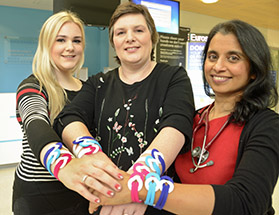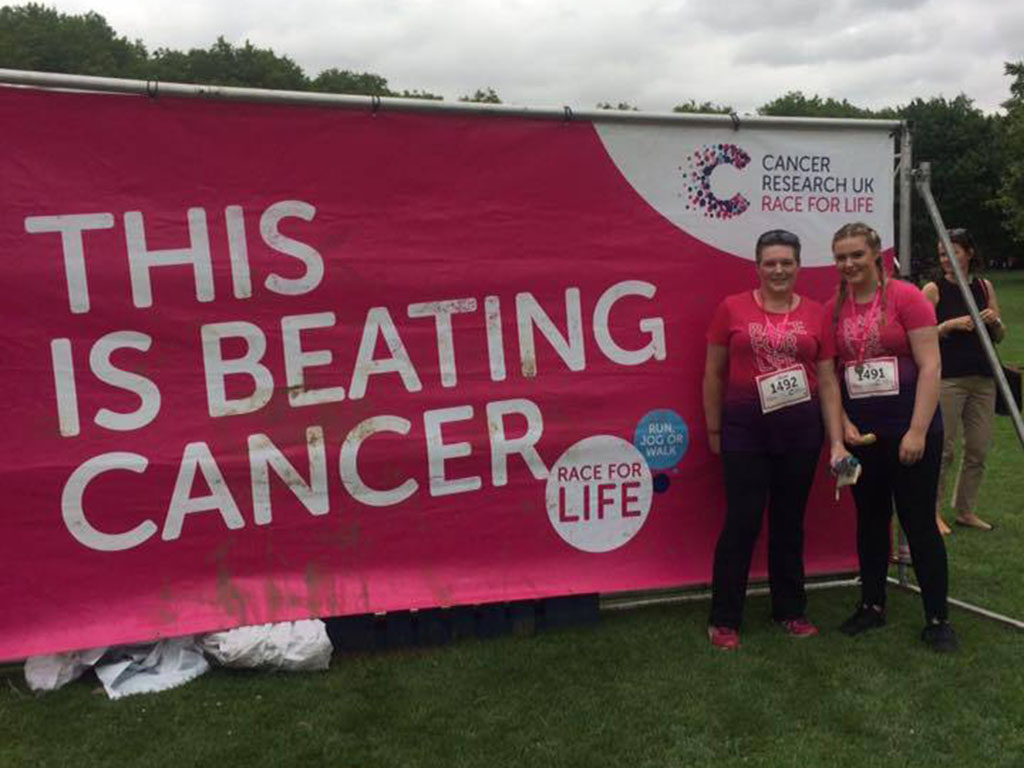
A Cambridge mum of two who was given the all clear from a fast growing type of breast cancer after taking part in a clinical trial at Addenbrooke’s, is urging people to show their support for research by wearing a unity band this World Cancer Day.
Catharine Scott, 50, started wearing a Cancer Research UK unity band after her diagnosis as it symbolises how researchers, doctors, fundraisers and loved ones come together to help people beat the disease.
Mrs Scott was diagnosed with a hormone negative type of breast cancer in September 2016, it has fewer treatment options as hormone therapy drugs cannot be used to fight the disease.
But Catharine’s consultant encouraged her to sign up for a research programme that might offer further insights into how to treat the cancer. Catharine’s DNA was screened and this showed she was likely to benefit from a CRUK and AstraZeneca funded clinical trial that was taking place at Addenbrooke’s.
Catharine signed up for the trial and by the halfway stage of her treatment had no sign of cancer left on her scans.
Since then Catharine has worn a Cancer Research UK unity band to raise awareness of the need for more research.
Catharine said: “Lucy, my daughter, recently turned 18. We had a mum and daughter celebration and it was lovely. I feel lucky that I am still here to celebrate special family moments but I know that not everyone is as fortunate, that’s why we need to keep going with research.
“I wear my unity band with pride, I rarely take it off! I am overdue a new one so am trading it in this year. I hope other people will join me and do the same.”
Catharine was diagnosed with breast cancer after she went to her GP about a pain near her ribs. She thought she had hurt herself in the gym but her GP examined her and referred her to the breast unit straight away.
Catharine said: “My diagnosis came as a real shock. The previous November I’d had a mammogram as part of the early call up programme, that came back all clear so I thought the pain couldn’t be anything serious, but it was quite a significant tumour and fast growing. It measured 4.9cm and was Grade 3 - a lot had happened in a few months.
“I had always thought breast cancer was breast cancer. I hadn’t realised there were the different types. That’s why the research into personalised medicine works because they can treat your cancer more effectively. It was a relief to realise it and to get the treatment that was right for me.”
Catharine’s consultant, Dr Jean Abraham, is a research clinician; working in the clinic with patients at Cambridge University Hospitals Trust and also with researchers at the CRUK Cambridge Centre and Cambridge Institute.
After analysing Catharine’s tumour and DNA, Dr Abraham put her forward for a national clinical trial called PARTNER, this involves taking an additional drug called olaparib.
Dr Jean Abraham said: “The cancer that Catharine had, triple negative breast cancer, has limited treatment options, it can be aggressive and Herceptin and hormone treatments do not help. The potential treatments are chemotherapy, radiotherapy and surgery. The treatment Catharine had is not available outside of the PARTNER Trial for women with early stage breast cancer. Catharine did extremely well in treatment, by the halfway point there was no sign of cancer. It’s a good day in the office when that happens!
“Working in the clinic is a constant reminder of the benefits that research has for patients but it also reminds me that there’s still a lot of work to do. One in two of us will be affected by cancer at some stage in our lives. Look at that statistic and the question has to be, why wouldn’t you want to help fund research? You or someone you love is likely to get this disease.
“It’s a really complex disease, it will take collaboration with lots of researchers to work out ways to limit and control it, whatever the cancer. Doing something, even if it’s donating £2 for a unity band, it’s £2 that pays out for us all.”
Cancer Research UK’s Unity Band features a classic reef knot design to symbolise the strength of people coming together to unite against cancer.
The bands are available in three different colours – pink, navy and blue – and can be worn in memory of a loved one, to celebrate people who’ve overcome the disease or in support of those going through treatment.
One in two people born after 1960 in the UK will be diagnosed with cancer at some point in their lifetime and although survival has doubled since the early 1970s, Cancer Research UK needs everyone to act right now to help speed up progress and see more people survive the disease.
Marked on February 4, World Cancer Day is designed to raise awareness of cancer and to promote its prevention, detection and treatment.
Unity Bands are available in all Cancer Research UK shops and online at www.cruk.org/worldcancerday
















